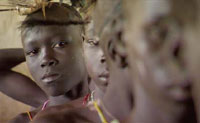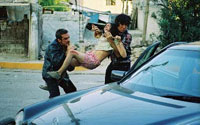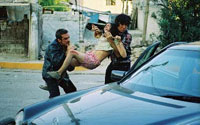I like books. My wife likes movies. OK, that’s too simplistic. I enjoy the occasional film and my wife always has at least one book going, but given the choice I’ll generally bury my nose in a book. So how was it then that I spent last week in Park City, Utah at the Sundance Film Festival? And how is it that I watched 11 films in five days and loved every minute of it?
Started in 1978 as a small festival for independent filmmakers to show their work, Sundance has evolved into the premier stateside film festival, garnering attention from around the world. If you’ve heard the noise this year about Dakota Fanning in Hounddog, then you you’ve experienced the Sundance hype. Given what I read about the festival beforehand, including the buzz about this year’s “it” films, it was surprising to find Park City rather subdued, less like Hollywood on Oscar night and more like, well, a bunch of normal folks interested in watching a bunch of films.
But how did the book-lover end up at the film festival? I was there mainly to take part in the Windrider Film Forum, which for three years has partnered with Fuller Theological Seminary, Biola University, and Mountain Vineyard Christian Fellowship to bring students and ministry folks to the festival.
We began each day with a teaching session led by Fuller professor and author Craig Detweiler. The sessions included teaching on God’s general revelation, cultural analysis, and the history of Sundance.
Toward the end of the week we had question-and-answer times with the filmmakers of Trade, The Monastery, For the Bible Tells Me So, and Save Me. These discussion times were some of the highlights of the week, and impressed on all of us just how passionately these filmmakers feel about their work. Before this festival I was unaware of the number of documentaries, dramas, comedies, and experimental films that are made each year that will never be seen outside of a festival. No wonder these filmmakers were so excited to talk with us about their films!
A few weeks before the festival I received a description of the Sundance films from which to make my selections. It’s hard to comprehend the number of films that show during the festival; while reviewing the list of award winners, I realized that I hadn’t even heard of some of the films that won.
The Top Four … for Me
Over the course of five days I saw 11 films. While I appreciated each of them, often for vastly different reasons, four that rose to the top: War/Dance, Save Me, Trade, and On the Road with Judas.

Directed by the husband-and-wife filmmaking team Sean Fine and Andrea Nix Fine, War/Dance won the Documentary Director Award. This tragically beautiful documentary tells the story of three children from northern Uganda, refugees of war, who are given a chance to experience a part of their lost childhood through Uganda’s national music and dance competition. Part Hotel Rwanda and part Mad Hot Ballroom, this film captures both the devastation of a country’s civil war on its children and the resiliency of those same children when given a chance to experience meaning and significance.
Save Me was the film that most caught me by surprise. As an evangelical Christian walking into a film about a young man’s journey through a Christian “ex-gay” 12-step ministry, there were certain things I expected to experience while watching. However, the portrayal of a Christian ministry leader by Judith Light and a gay man by Chad Allen (who played Nate Saint in End of the Spear) created feelings for me that were completely unexpected. Rather than feeling cornered and defensive, this film seems to invite dialogue between the gay community and the evangelical community. I left the theatre shaking my head at what I’d seen, and somehow hopeful for the future of this polarizing issue.

If Save Me was the most surprising film I watched, Trade was the most difficult. Filmed in Mexico and the United State, Trade tells the story of sex trafficking between the two countries, and the innocent women and children devastated by its effect. Producer Rosilyn Heller shared with the Windrider Film Forum her own passion for this issue and how challenging it was to make a film that didn’t gloss over the devastation of the sex trade while also dignifying the innocent victims being abused by it. If a film can raise righteous anger and a call for justice, this one does it. I’m not sure I could watch it again, but I’m thankful to the filmmakers for pointing their cameras into some of the darkest corners of our world.
Not all the films at Sundance are as gut-wrenching as War/Dance, Save Me, and Trade. King of California, starring Michael Douglas, is a quirky story about a possibly crazy but always believing dad and his ultra-responsible and skeptical daughter. More enjoyable and interesting is the directorial debut by novelist JJ Lask, On the Road with Judas, which was introduced to us at the theatre as a “quintessential postmodern story.” According to the Sundance website, “On the Road with Judas is a film based on a real novel, written by a writer, played by an actor, about the real characters and the actors playing those characters in this story.” Got it?
About three days into the festival I realized that Sundance was messing with my head … in a good way. I’ve generally viewed films as a form of entertainment, right up there with bowling or dining out. However, the Windrider Film Forum helped me to see that there was much more to these films than entertainment value.
The filmmakers we interacted with each had a story to tell. For some, it is a story of the devastation and injustice prevalent in our world. For others, the story involves the human longing for love and significance. At Windrider we were challenged to ask of the films we watched, “What is the story being told?” And, “What can we say of God’s presence in the work of these filmmakers?”
As Craig Detweiler put it, “Hollywood films are meant to comfort the afflicted. Sundance films are meant to afflict the comfortable.” Certainly both comfort and affliction are needed in our world today.
As a pastor I know my tendency is often toward the Hollywood way of things. Perhaps Sundance can teach us the value of being afflicted, of having our eyes opened more widely to the God of afflicted. Not just in films of course, but to the whole of life in God’s world. And for that reminder I’m thankful to the Sundance Film Festival.
David Swanson is associate pastor of Parkview Community Church in Glen Ellyn, Illinois. He also filed a couple Sundancereports for the Out of Ur blog.
Copyright © 2007 Christianity Today. Click for reprint information.










